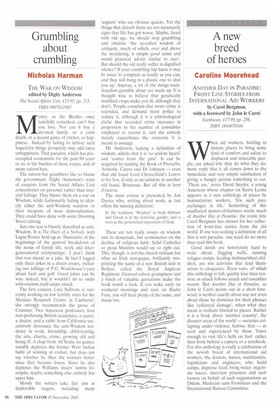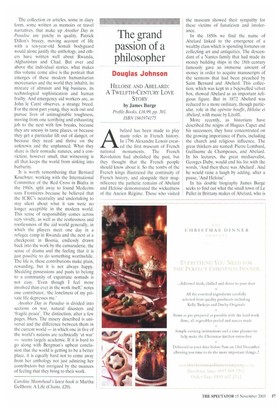A new breed of heroes
Caroline Moorehead
ANOTHER DAY IN PARADISE: FRONT LINE STORIES FROM INTERNATIONAL AID WORKERS by Carol Bergman, with a foreword by John le Carre Earthscan, £17.99, pp. 256, ISBN 1844070344 When aid workers, battling in distant places to bring some kind of comfort and safety to displaced and miserable people, are asked why they do what they do, many reply that it all comes down to the immediate and very simple satisfaction of giving a hungry person something to eat. 'There are,' notes David Snyder, a young American whose chapter on Sierra Leone appears in a new anthology of pieces by humanitarian workers, `few such pure exchanges in life.' Something of this unaffected matter-of-factness marks much of Another Day in Paradise, the ironic title Carol Bergman has chosen for her collection of front-line stories from the aid world. If one was seeking a definition of all that is not paradise, one need do no more than read this book.
Good deeds are notoriously hard to write about. Digging wells, running refugee camps, feeding malnourished children, are not activities that lend themselves to eloquence. Even wars, of which this anthology is full, quickly lose their tension, as attack follows attack and casualties mount. But Another Day in Paradise. as John le Carte points out in a short foreword, is neither exactly about war nor even about those he dismisses for their phrases like 'collateral damage', when what they mean is civilians blasted to pieces. Rather it is a book about 'another country', the disaster areas of the world — societies collapsing under violence, famine, fear — as seen and experienced by those 'brave enough to visit life's hells on foot' rather than from behind a camera or a notebook. For this anthology is really a celebration of the newish breed of international aid workers, the doctors, nurses, nutritionists, logisticians and engineers, who build camps, dispense food, bring water, negotiate truces. interview prisoners and curb looters on behalf of such organisations as Oxfam, Medecins sans Frontieres and the International Rescue Committee. The collection or articles, some in diary form, some written as memoirs or travel narratives, that make up Another Day in Paradise are patchy in quality. Patrick Dillon's breezy, moving account of life with a ten-year-old Somali bodyguard would alone justify the anthology, and others have written well about Rwanda, Afghanistan and Chad. But over and above the individual stories, what makes this volume come alive is the portrait that emerges of these modern humanitarian mercenaries and the world they inhabit, its mixture of altruism and big business, its technological sophistication and human frailty. And emergency aid workers are, as John le Cane" observes, a strange breed. For the most part young, they seek out and pursue lives of unimaginable toughness, moving from one terrifying and exhausting job to the next with few breaks, because they are uneasy in tame places, or because they get a particular lift out of danger, or because they need and thrive on the unknown and the unplanned. What they share is their nomadic natures, and a conviction, however small, that witnessing is all that keeps the world from sinking into barbarity.
It is worth remembering that Bernard Kouchner, working with the International Committee of the Red Cross in Biafra in the 1960s, split away to found Medecins sans Frontieres because he believed that the ICRC's neutrality and undertaking to stay silent about what it saw were no longer acceptible in the modern world. This sense of responsibility comes across very vividly, as well as the restlessness and rootlessness of the aid world generally, in which the players meet one day in a refugee camp in Rwanda and the next at a checkpoint in Bosnia, endlessly drawn back into the work by the camaraderie, the sense of drama and the feeling that it is just possible to do something worthwhile. The life is, these contributions make plain, rewarding, but it is not always happy. Shedding possessions and pasts to belong to a community of expatriate nomads is not easy. 'Even though I feel more involved than ever in the work itself,' notes one contributor, 'the loneliness of my private life depresses me.'
Another Day in Paradise is divided into sections on war, natural disasters and 'fragile peace'. The distinction, after a few pages, blurs. The misery described is universal and the difference between them in the current world — in which one in five of the world's nations are technically 'at war' — seems largely academic. If it is hard to go along with Bergman's upbeat conclusion that the world is getting to be a better place, it is equally hard not to come away from her anthology not just admiring her contributors but intrigued by the nuances of feeling that they bring to their work.
Caroline Moorehead's latest book is Martha Gellhorn: A Life (Chatto, £20).



























































































 Previous page
Previous page